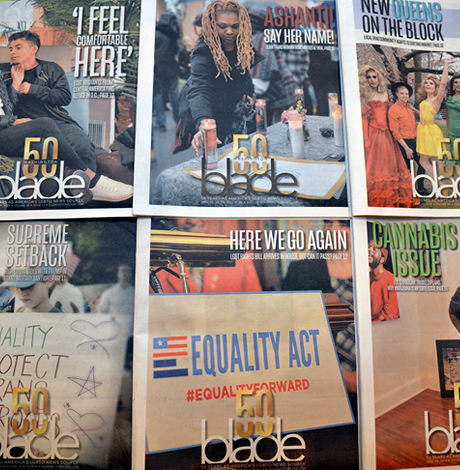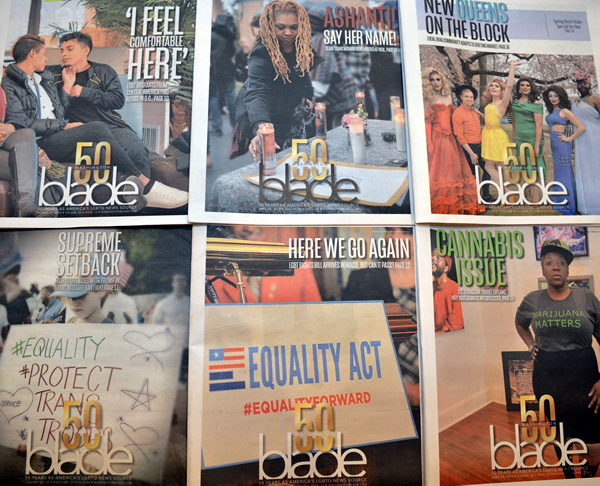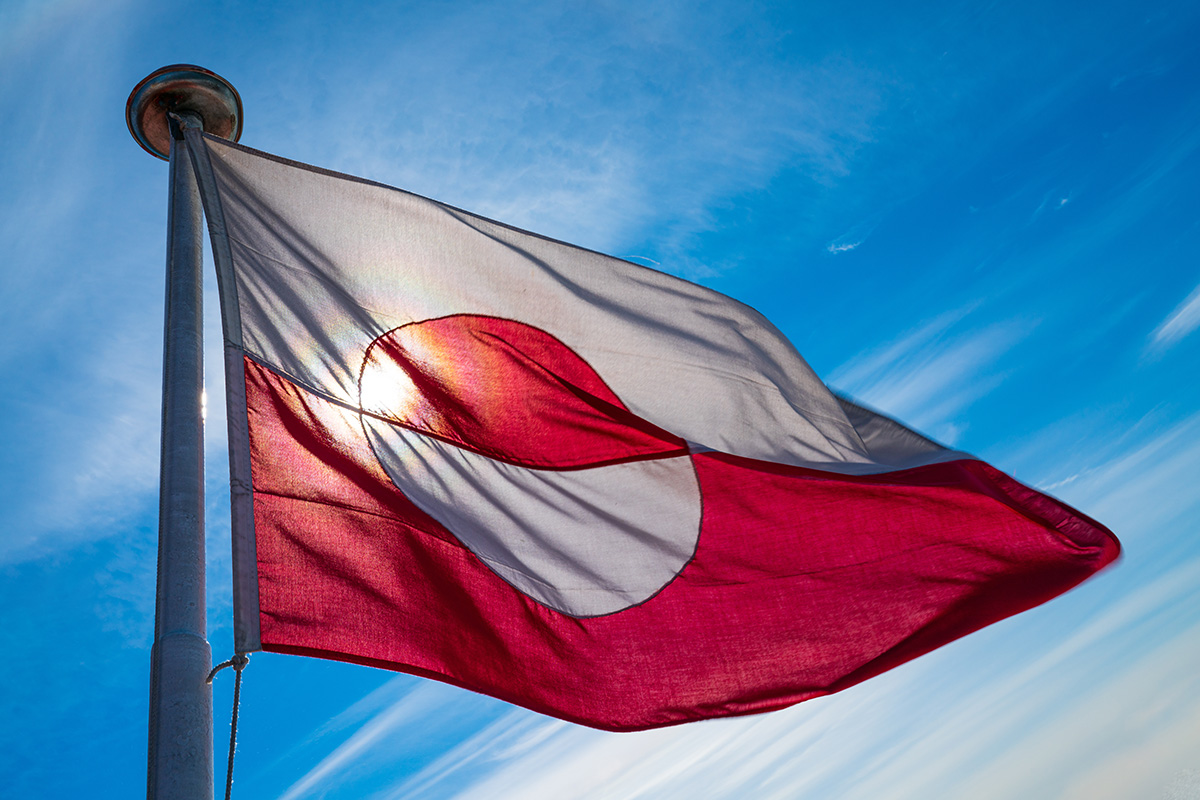Opinions
Blade’s mission continues amid crisis
We have been here before and must persevere


Despite the economic chaos and uncertainty unleashed by the coronavirus pandemic, the Blade staff continues to work hard bringing our readers the local, national, and international news needed to navigate this crisis.
On Tuesday, the White House pool report for the world’s press was written by the Blade’s Chris Johnson, who spent the day shadowing President Trump, even as Trump continues his reckless attacks on journalists.
Also this week, our own Lou Chibbaro Jr. is working hard to cover the virus’s impact on D.C., just as he covered the AIDS epidemic in the 1980s. And Michael K. Lavers is interviewing LGBTQ activists around the world, including in hard-hit Spain, to assess the unique impacts on our community overseas.
Sure, we’re all in this together, but the LGBTQ community suffers unique challenges. Our elders are more likely to live alone and suffer from isolation and depression; our youth are more likely to be homeless and thus susceptible to the disease; we are disproportionately entrepreneurial, putting many of our businesses in jeopardy; the HIV-positive among us are more susceptible to infection; LGBTQ and HIV-positive migrants face considerable risk. We’re working to cover all of these stories and more impacting the LGBTQ community.
Small businesses, including the Blade, are particularly vulnerable right now, as the government ponders massive bailouts for undeserving cruise lines and airlines, while tossing crumbs at small businesses, the backbone of the U.S. economy. If you are in a position to donate to support our work, please visit bladefoundation.org.
Indeed, as Los Angeles Mayor Eric Garrcetti told the Los Angeles Blade’s Karen Ocamb last week, “This community has been through tougher days than this and the most important thing is to not only be resilient but to be calm … The overwhelming majority of people are going to not only make it through this but we will come back, but we can be leaders.”
He’s right. When the world turned its back during the height of the AIDS crisis, it was LGBTQ activists who led the way, fought for new drugs, held the government accountable, and shamed religious and political leaders into action.
We must take up that role again today, telling the truth about President Trump’s irresponsible and dangerous approach to coronavirus. He uses the power of the bully pulpit to spout misinformation that proved fatal to one man who ingested chloroquine based on Trump’s ill-informed recommendation. Worse, Trump ignored warnings in his security briefings about COVID-19 for weeks in January and February, costing us precious time that has led to the deaths of more than 600 Americans as of mid-week. The final toll will be far higher and likely more than the death toll of our deadliest war, the Civil War, which claimed roughly 750,000 American lives.
He talks about being a “war-time president,” yet refuses to invoke the Defense Production Act to procure desperately needed personal protective equipment for hospital staff and first responders. His failure to supply adequate tests for the virus is an inexcusable dereliction of duty. We are seeing the full scope of what it means to elect a realty TV show host with no government experience to run the country. We can only hope the latest polls showing Joe Biden with a landslide-scale lead hold up.
In the meantime, stay safe and off the streets and practice social distancing. The Blade will publish in print as long as is feasible as well as online. Stay informed via our social media posts on Facebook, Twitter and Instagram. Sign up for our e-mail newsletters at washingtonblade.com/subscribe. Advertise if you can (email my colleague Brian Pitts at [email protected]).
Most importantly, don’t panic. We’ve survived a pandemic before and will persevere again.
Kevin Naff is editor of the Washington Blade. Reach him at [email protected].

January arrives with optimism. New year energy. Fresh possibilities. A belief that this could finally be the year things change. And every January, I watch people respond to that optimism the same way. By adding.
More workouts. More structure. More goals. More commitments. More pressure to transform. We add healthier meals. We add more family time. We add more career focus. We add more boundaries. We add more growth. Somewhere along the way, transformation becomes a list instead of a direction.
But what no one talks about enough is this: You can only receive what you actually have space for. You don’t have unlimited energy. You have 100 percent. That’s it. Not 120. Not 200. Not grind harder and magically find more.
Your body knows this even if your calendar ignores it. Your nervous system knows it even if your ambition doesn’t want to admit it. When you try to pour more into a cup that’s already full, something spills. Usually it’s your peace. Or your consistency. Or your health.
What I’ve learned over time is that most people don’t need more motivation. They need clarity. Not more goals, but priority. Not more opportunity, but discernment.
So this January, instead of asking what you’re going to add, I want to offer something different. What if this year becomes a season of no.
No to things that drain you. No to things that distract you. No to things that look good on paper but don’t feel right in your body. And to make this real, here’s how you actually do it.
Identify your one true priority and protect it
Most people struggle with saying no because they haven’t clearly said yes to anything first. When everything matters, nothing actually does. Pick one priority for this season. Not 10. One. Once you identify it, everything else gets filtered through that lens. Does this support my priority, or does it compete with it?
Earlier this year, I had two leases in my hands. One for Shaw and one for National Landing in Virginia. From the outside, the move felt obvious. Growth is celebrated. Expansion is rewarded. More locations look like success. But my gut and my nervous system told me I couldn’t do both.
Saying no felt like failure at first. It felt like I was slowing down when I was supposed to be speeding up. But what I was really doing was choosing alignment over optics.
I knew what I was capable of thriving in. I knew my limits. I knew my personal life mattered. My boyfriend mattered. My family mattered. My physical health mattered. My mental health mattered. Looking back now, saying no was one of the best decisions I could have made for myself and for my team.
If something feels forced, rushed, or misaligned, trust that signal. If it’s meant for you, it will come back when the timing is right.
Look inside before you look outside
So many of us are chasing who we think we’re supposed to be— who the city needs us to be. Who social media rewards. Who our resume says we should become next. But clarity doesn’t come from noise. It comes from stillness. Moments of silence. Moments of gratitude. Moments where your nervous system can settle. Your body already knows who you are long before your ego tries to upgrade you.
One of the most powerful phrases I ever practiced was simple: You are enough.
I said it for years before I believed it. And when I finally did, everything shifted. I stopped chasing growth just to prove something. I stopped adding just to feel worthy. I could maintain. I could breathe. I could be OK where I was.
Gerard from Baltimore was enough. Anything else I added became extra.
Turning 40 made this clearer than ever. My twenties were about finding myself. My thirties were about proving myself. My forties are about being myself.
I wish I knew then what I know now. I hope the 20 year olds catch it early. I hope the 30 year olds don’t wait as long as I did.
Because the only way to truly say yes to yourself is by saying no first.
Remove more than you add
Before you write your resolutions, try this. If you plan to add three things this year, identify six things you’re willing to remove. Habits. Distractions. Commitments. Energy leaks.
Maybe growth doesn’t look like expansion for you this year. Maybe it looks like focus. Maybe it looks like honoring your limits. January isn’t asking you to become superhuman. It’s asking you to become intentional. And sometimes the most powerful word you can say for your future is no.
With love always, Coach G.
Gerard Burley, also known as Coach G, is founder and CEO of Sweat DC.
Greenland
The Greenland lesson for LGBTQ people
Playbook is the same for our community and Europeans

I understand my own geopolitical limits and don’t pretend to know how Europeans should respond to U.S. threats to seize Greenland or retaliate against anyone who opposes them. However, as I mentioned in March, it’s clear that for Europeans and LGBTQ+ people alike, hug-and-kiss diplomacy is over.
In practice, that means responding to the U.S. administration’s provocations with dialogue, human‑rights rhetoric, and reasoning may now be counterproductive. It looks weak. At some point, Europeans will have to draw a line and show how bullying allies and breaking international agreements carry a cost — and that the cost is unpredictable. On the surface, they have few options; like LGBTQ+ communities, they are very behind in raw power and took too long to wake up. But they still have leverage, and they can still inflict harm.
Maybe it is time for them to call the bluff. America has a great deal to lose, not least its reputation and credibility on the world stage. Stephen Miller and Pete Hegseth, with all their bravado, obviously underestimate both the short‑ and long‑term geopolitical price of ridicule. Force the United States to contemplate sending troops into an ally’s territory, and let the consequences play out in international opinion, institutions, and markets.
In the United States, LGBTQ+ communities have already endured a cascade of humiliations and live under constant threat of more. In 2025 our symbols and heroes were systematically erased or defaced: the USNS Harvey Milk was quietly renamed after a straight war hero, Admiral Rachel Levine’s title and image were scrubbed from official materials, Pride flags were banned from public buildings, World AIDS Day events were defunded or stripped of queer content, the Orlando memorial and other sites of mourning were targeted, the U.S. lead a campaign against LGBTQ+ language at the U.N., and rainbow crosswalks were literally ripped up or painted over. We cannot simply register our distress; we must articulate a response.
In practice, that means being intentional and focused. We should select a few unmistakable examples: a company that visibly broke faith with us, a vulnerable political figure whose actions demand consequences, and an institution that depends on constituencies that still need us. The tools matter less than the concentration of force — boycotts, shaming, targeted campaigning all qualify — so long as crossing certain lines produces visible, memorable costs.
A friend suggested we create what he called a “c***t committee.” I liked the discipline it implies: a deliberate, collective decision to carefully select a few targets and follow through. We need a win badly in 2026.
These thoughts are part of a broader reflection on the character of our movement I’d like to explore in the coming months. My friends know that anger and sarcasm carried me for a long time, but eventually delivered diminishing returns. I am incrementally changing these aspects of my character that stand in the way of my goals. The movement is in a similar place: the tactics that served us best are losing effectiveness because the terrain has shifted. The Greenland moment clarifies that we must have a two-pronged approach: building long-term power and, in the short term, punching a few people in the nose.
Opinions
Media obsess over ‘Heated Rivalry’ sex but ignore problem of homophobia in sports
4 major men’s leagues lack gay representation 13 years after Jason Collins came out

The mainstream media are agog over “Heated Rivalry,” the surprise hit HBO Max limited series about two professional hockey players who fall in love.
The show’s stars, Connor Storrie (Ilya) and Hudson Williams (Shane), are everywhere — red carpets, award shows, morning news and late night shows. Female fans lined up for hours to catch a glimpse of Storrie, who appeared on the “Today” show last week.
The interviews and coverage predictably involve lots of innuendo and snickering about the graphic sex scenes in the show. Storrie and Williams have played coy about their real-life sexual orientation, a subject of debate among some gay fans who would prefer they own their sexuality if, in fact, they are gay.
But the big issue ignored by the media that the show tackles is the crippling effect of homophobia and the closet — not just on professional athletes but on anyone who isn’t comfortable being out at work. And it’s a growing problem given the hostile Trump administration. Attacks on LGBTQ people and the roll back of DEI and related protections are driving many Americans back into the closet, especially in D.C.’s large federal workforce.
And the mainstream media seem totally unaware that there has never been an openly gay NHL player. Hell, there’s never even been a retired NHL player who came out.
It’s a sad fact that I would not have predicted 13 years ago when Jason Collins bravely came out publicly while playing in the NBA, the first male athlete in the big four U.S. sports to do so. His announcement was widely covered in the mainstream media and Collins was even named to Time magazine’s “100 Most Influential People” list in 2014.
Then in February 2014, Michael Sam became the first openly gay player to be drafted into the NFL. He was released before the season began and did not play. But still, Sam’s decision to come out was celebrated. It felt like professional male sports was changing and finally shaking off its ingrained homophobia. Many of us awaited a flood of young professional athletes coming out publicly. And we waited. And waited. Then, seven years later, in June 2021, Carl Nassib came out, becoming the first active NFL player to do so. He was with the Las Vegas Raiders at the time and also became the first out player to play in the playoffs. He was released in the offseason and picked up by the Tampa Bay Buccaneers in 2022 and retired the following year.
And that is the short history of out professional male athletes in the big four U.S. sports. (Women’s sports is a different story with many examples of out lesbian and bi players.)
Sure, some pro athletes have come out after retiring, most notably Billy Bean, who went on to a long and successful career advocating from within for gay representation in Major League Baseball as the league’s vice president and ambassador for inclusion and later as senior vice president and special assistant to the commissioner.
But that’s a sorry record and professional sports leagues should redouble their efforts at making gay players (and fans) feel welcome. From fully embracing Pride nights again to adopting zero tolerance policies for hate speech, there’s much more work to be done to make it easier for pro male athletes to come out.
“Heated Rivalry” star Williams recently told an interviewer that he has received private messages from closeted active pro athletes in multiple sports who don’t feel they can come out. How sad that in 2026, even the most successful (and wealthy) among us still feel compelled to hide in the closet.
Let’s hope that “Heated Rivalry,” which has been renewed for a second season, sparks a more enlightened conversation about the closet and the need to foster affirming workplaces in professional sports and beyond.
Kevin Naff is editor of the Washington Blade. Reach him at [email protected].



















